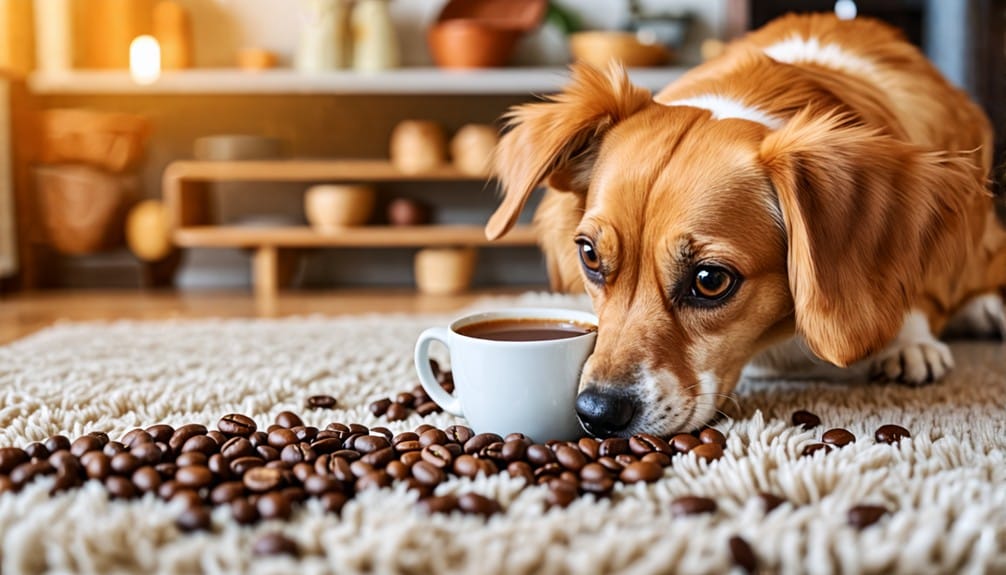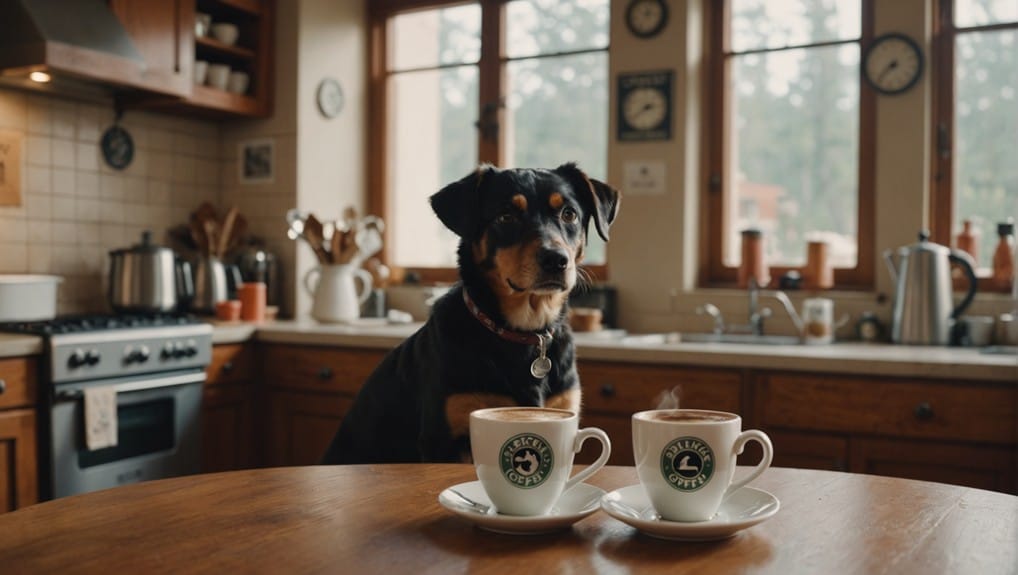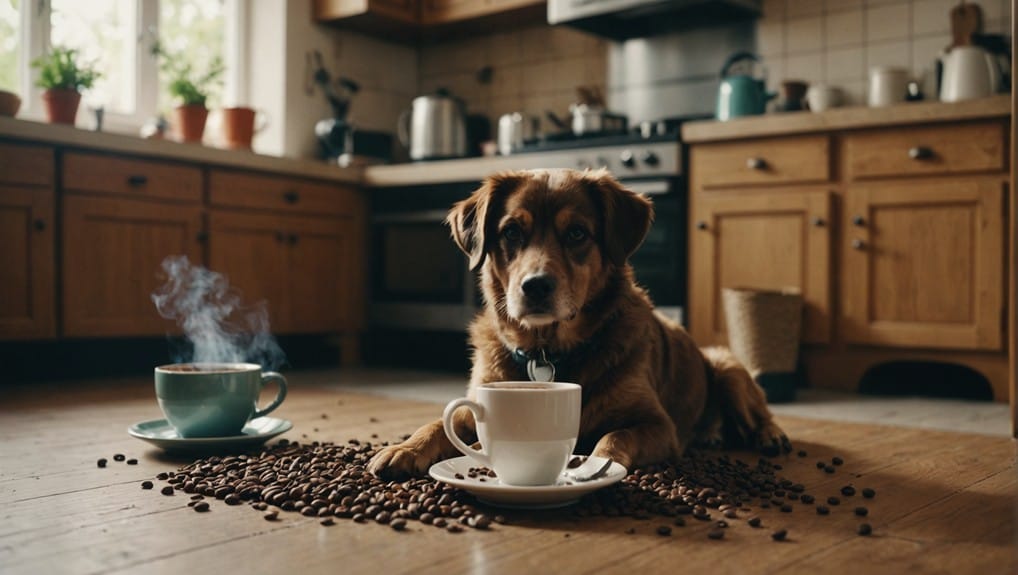Physical Address
304 North Cardinal St.
Dorchester Center, MA 02124
Physical Address
304 North Cardinal St.
Dorchester Center, MA 02124

Coffee might perk you up, but it can be a sneaky danger for your canine companion! Dogs are super sensitive to caffeine, and just a tiny amount can lead to serious health issues, like vomiting, restlessness, and even seizures. Even decaf isn’t completely safe—those trace caffeine levels can still harm them. To keep your pup happy and safe, avoid leaving coffee grounds or cups within their reach. Instead, treat them to something fun and dog-friendly, like peanut butter or pumpkin snacks. Want to know more about keeping your dog safe from other hidden hazards? Let’s investigate!
Coffee is unsafe for dogs, and it’s important to understand why. As you might enjoy a morning brew, your four-legged companion doesn’t share the same taste.
Dogs are more sensitive to caffeine than we are, which can drastically affect their behavior and health. Just a tiny sip mightn’t seem harmful, but it could spark a desire for more, leading to trouble.
Instead of risking your pup’s health, why not investigate some coffee alternatives? Treat your dog to tasty, safe snacks that won’t send their heart racing. Think peanut butter or pumpkin-flavored goodies!
Keeping caffeine away from your dog is a smart choice, ensuring their happiness and safety as you enjoy your favorite cup of joe.
The dangers of caffeine toxicity in dogs can manifest quickly and severely. Your canine companion’s caffeine sensitivity means that even a tiny amount can cause serious problems.
Just around 9 mg of caffeine per pound of body weight can push them past the toxic threshold, leading to symptoms like vomiting, diarrhea, and even seizures. It’s like giving them a roller coaster ride they didn’t sign up for!
Coffee grounds and beans are just as harmful as the drink itself, so don’t let them get curious. In extreme cases, caffeine can be fatal.
If you suspect your dog has ingested coffee, don’t wait—contact your vet immediately. Keeping coffee away from your pup is the best way to guarantee their safety!

Though many people believe decaf coffee is safe for dogs, it’s important to know that it still poses risks.
Decaf misconceptions can lead you to think your four-legged buddy is in the clear, but decaf still contains trace amounts of caffeine. Even small amounts can affect dogs, so it’s best to steer clear of any coffee products.
Instead, look for safe alternatives that won’t put your pup at risk. Treats made for dogs, like peanut butter or pumpkin-flavored goodies, are great options.
When a dog ingests caffeine, recognizing the signs of poisoning quickly can make a significant difference in their health outcome.
Dogs have a unique caffeine sensitivity, so it’s essential to watch for symptoms. Here are three key signs of caffeine poisoning to look out for:
If you notice these symptoms, contact your vet right away to protect your dog’s health.

Keeping your dog’s safety in mind is crucial regarding preventing caffeine exposure. First, don’t leave coffee cups or grounds unattended; they can be tempting for your curious pup.
Ensure to stash all caffeinated items out of reach, including tea and anything with chocolate. Caffeine awareness is key! Educate friends and family about the risks, so no one inadvertently shares their coffee with your pet.
In terms of treats, skip the coffee-flavored ones; there are plenty of dog-safe options available. If you suspect your dog has ingested caffeine, don’t wait—contact your vet right away! Quick action can save the day.
To summarize, keeping your dog safe from coffee is super important! Even a tiny sip can lead to big trouble for your four-legged companion. By being aware of the signs of caffeine poisoning and taking simple preventive steps, you can protect your pup from harm. So, as you enjoy your morning brew, be certain your dog sticks to their water bowl. After all, no one wants a hyper pup bouncing off the walls! Stay vigilant and keep those tails wagging!
Small amounts of coffee aren’t safe for dogs. Although you might think caffeine offers benefits, even minimal coffee consumption can lead to harmful effects. It’s best to keep caffeinated products away from your pet.
If your dog consumes coffee, monitor for symptoms of toxicity like vomiting or restlessness. Take immediate actions by contacting your veterinarian for guidance, as prompt treatment can greatly improve your dog’s chances of recovery.
You can find dog-friendly recipes that use safe ingredients like peanut butter or pumpkin. Look for caffeine-free options that keep your pup happy and healthy during avoiding harmful substances found in coffee products.
A dog’s size markedly impacts caffeine metabolism. Heavier dogs can tolerate more caffeine, but smaller dogs are at higher risk for toxicity because of weight considerations. Always monitor caffeine intake to guarantee your dog’s safety.
Yes, other foods can contain harmful caffeine sources for dogs. Always check labels for hidden caffeine, like in chocolate or energy bars. Prioritize food safety by keeping these items well out of your dog’s reach.